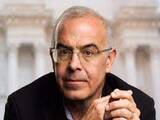weekly column
|
Each week, find a commentary on something connected to verses of Torah or another source of wisdom
|
|
Each week, find a commentary on something connected to verses of Torah or another source of wisdom
|
 Wisdom Wherever You Find It The awareness of sin is the essence of humility. David Brooks Sooner or later, David Brooks had to turn up in this rotation of wisdom. Perhaps it is surprising that I, a rabbi, would find a representative quotation from a Jew that sounds so Christian. Brooks has been often honest, sometimes coy about his personal religious identity, but his integrity continues to lead him to consider insight wherever he finds it. We live in a culture of self-affirmation. My impression, after forty years of exploring spiritual concerns with people, is that most of us, myself included, talk the talk, but are still pretty insecure about our sense of personal worth. We substitute bravado for true certainty and spend time in the shower or under the covers being reluctantly honest with ourselves. In fact, I once asked a psychiatrist what he had gleaned from his years of treating patients. He said he had been therapist to janitors, doctors, teachers, businesspeople, and those in every imaginable walk of life, and they all expressed one thing in common in the safety and privacy of his office. They all believed themselves to be frauds, and it was only a matter of time until they were found out. That very human sentiment is, I believe, very much at the root of religion. And I will offer a very broad understanding of religion as any set of values that posits a code of behavior (and even belief) that is more than the immediate interests of the believer. You needn’t posit a deity or an external moral code to believe in altruism. But once you posit that we each have more responsibility in this world than to serve ourselves – and anyone who isn’t a sociopath believes that – you believe in sin by any other name. Sin is what separates us from the ideal. I am not embarrassed to name my ideal – God – but I can forego the label in pursuit of my point. When we are less than our authentic and whole selves, we sin. And because we are aware of it, whether purposefully and consciously or by our innate and private sense of being a fraud, we are humbled. Humility is an acceptance that we have fallen short of the ideal. The season during which I am writing these words is sacred to Christians because it leads to the very initiation of their faith. Christmas is celebrated as the birthday of Jesus who, as Christianity claims, came into this world as a gift from the ideal (God) to take away our shortcomings (sin). It is a powerful message, and it is therefore no wonder that this religion has gained so many adherents. A true Christian, I am told (by true Christians, of course) is humble constantly because of their awareness of the constant presence of sin as part of their nature. (I am also told that anyone not possessed of a humble nature is not really a true Christian, but I will leave that to believers to debate.) But Brooks’s wisdom, whether it emerges from insight or faith, applies to those of us, including me, who find its truth to be independent of the message of any faith or philosophy. The arrogant person, the one who proclaims, “I’m kind of a big deal,” is publicly unaware of falling short of their ideal because of their unawareness of sin. Privately, on the other hand, no person who pretends to goodness can be arrogant. I probably used to believe you had to be a person of faith to be a good person. I might even plead guilty to once believing you had to be Jewish to be a good person. Evidence to the contrary is too strong for me to lay claim to either position any more. All I know with any degree of confidence is myself. I shudder to think what kind of person I might be without my religion to hold before me a path to the ideal. I am no longer discouraged to admit that at best I can hope to stand occasionally in the wake of the ideal. I fall short, that is, I sin. It keeps me humble to remember it, even in those moments in the wake. Our culture of self-affirmation has rejected the dour image of humanity promoted by the formal sin-and-redemption stance of established religions. Mostly, that’s a good thing. We may not be perfect, but mostly we are not all that bad. But by discarding the notion of sin – of falling short of the ideal – we run the risk of closing the door to embracing the potential of being better than we are. All that humility really means is that I can do better, and the awareness of my need to do better is the essence of humility, and the roadmap that leads away from believing I am a fraud.
0 Comments
Leave a Reply. |
Archives
October 2023
Categories |